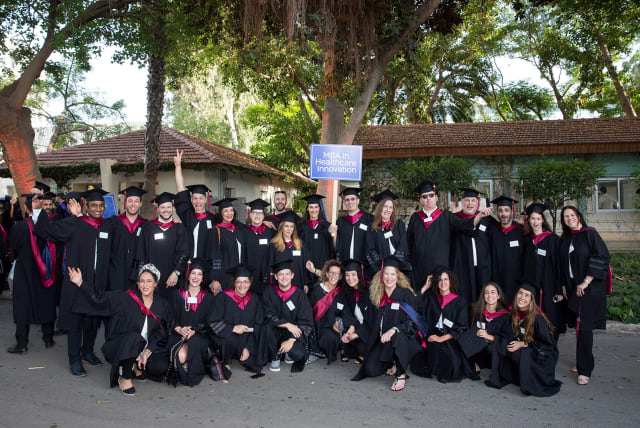Healthcare Innovation in the Startup Nation

Reichman University’s MBA in Healthcare Innovation Provides our students with the tools & skills necessary to understand the complexity of the healthcare world today.
"Innovation doesn’t need only brilliant ideas but also skills with systematic approach," Nhat Luong, founder and CEO of DiaB Healthcare and an alumnus of Reichman University recently said.
Luong a native of Vietnam, is one of hundreds of students who have come to Israel – the Startup Nation – to learn and expand their expertise in the rapidly growing global field of Healthcare Innovation.
This is made possible through a first-of-its-kind MBA program in Israel by Reichman University in partnership with Sheba-Tel HaShomer hospital, recently ranked by Newsweek as one of the top 10 best hospitals in the world.
“This program equipped me with a new methodology of thinking associated with practical experience in the real world at Sheba and it has helped me grow further in my professional career,” Luong said.
The one-year MBA is specifically designed for professionals from Israel and abroad who have experience in the field of healthcare and are looking to expand their management, innovation, and entrepreneurship skills.
All classes are conducted in English on the backdrop of Reichman University - the most international campus in Israel.
As part of the program students will master three core areas: business administration, healthcare management, and innovation and entrepreneurship, while receiving hands-on experience at Sheba as well as other organizations. Additionally, the program features guest lecturers from Ivy league universities and includes a study trip to the Silicon Valley.
Professor Varda Liberman, founder and head of the MBA Healthcare Innovation program said that today, healthcare systems are going through enormous changes worldwide that will require a complete redesign of the healthcare system.
"Our program is designed to prepare the future leaders of the healthcare industry to develop solutions that will enable a redesign on the technological, scientific, pharmaceutical, digital, and policy levels," she said.
She added, "It will also prepare them for emergency and disaster management, where we foresee a growing global need. The program brings together all the unique advantages of Israeli innovation, to provide our students with the tools and skills necessary to understand the complexity of the healthcare world today."
Like Luong, Ariel Zylberstejn, a recent graduate of the MBA program came to Israel to learn new areas of interest and to improve and grow his company. He said his experience was "unforgettable."
"Coming all the way from Mexico to study the Healthcare innovation program was immensely valuable for my life, my family, and my company. I took time to learn and reflect. I met great people and re-built the vision for my company," he said.
Another alumnus, Dr. Chidanand Kumar, a trained medical doctor from India, came to Reichman University to pursue his dream of becoming an entrepreneur in the healthcare industry.
He graduated from the program in 2022, at the height of the coronavirus pandemic, and credits his time in Israel for “completely changing my outlook on how to approach problems in the healthcare industry.”
"This MBA is a very unique and dynamic program, bringing together a carefully selected multidisciplinary group of people, all with the same drive for innovation in healthcare," he said.
He added that, "I also made connections with my classmates, and I feel I gained as much from them as from my teachers and created an incredible network in Israel to be able to reach out and connect to the startup ecosystem.”
With regards to the startup ecosystem, one of the most valuable lessons Dr. Kumar said he received from the program was the "de-stigmatization of failure."
"In other countries failure as a startup is frowned upon, but in Israel this is not the case. It is okay to fail and then start again - this is something that I will take back with me for the rest of my life, and I think this notion provides me a great advantage," he said.
This article was written in cooperation with Reichman University
Jerusalem Post Store
`; document.getElementById("linkPremium").innerHTML = cont; var divWithLink = document.getElementById("premium-link"); if (divWithLink !== null && divWithLink !== 'undefined') { divWithLink.style.border = "solid 1px #cb0f3e"; divWithLink.style.textAlign = "center"; divWithLink.style.marginBottom = "15px"; divWithLink.style.marginTop = "15px"; divWithLink.style.width = "100%"; divWithLink.style.backgroundColor = "#122952"; divWithLink.style.color = "#ffffff"; divWithLink.style.lineHeight = "1.5"; } } (function (v, i) { });
